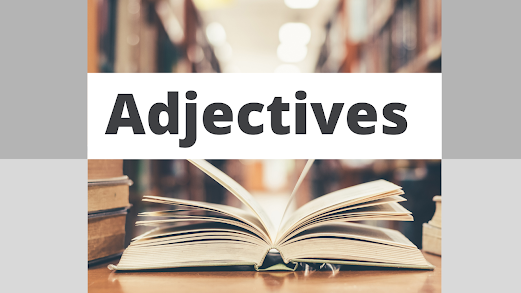Adjectives
Adjectives
An adjective is a word that tells us more
about a noun.
It "describes" or "modifies" a noun.
Adjectives are used to identify or
quantify individual people and
unique things
Adjectives are words that describe or
modify other words, making your writing
and speaking much more specific, and a
whole lot more interesting. Words like
small, blue, and sharp are descriptive, and
they are all examples of adjectives.
Adjective Examples:
In the following examples, the highlighted words are
adjectives:
1.They live in a big, beautiful house.
2.Since it’s a hot day, Lisa is wearing a sleeveless shirt.
3.The mountaintops are covered in sparkling.
4.On her birthday, Brenda received an antique vase
filled with fragrant.
Types of Adjectives
1: Numbers Adjectives:
When they’re used in sentences, numbers are
almost always adjectives. You can tell that a
number is an adjective when it answers the
question “How many?”
•The stagecoach was pulled by a team of six.
•He ate 23 hotdogs during the contest, and was
sick afterwards.
2: Interrogative Adjectives: ( Question)
There are three interrogative adjectives: which,
what, and whose. Like all other types of adjectives,
interrogative adjectives modify nouns. As you probably
know, all three of these words are used to ask questions.
•Which option sounds best to you?
•What time should we go?
•Whose socks are those?
3: Indefinite Adjectives:
Like the articles a and an, indefinite adjectives are used to
discuss non-specific things. You might recognize them,
since they’re formed from indefinite pronouns. The most
common indefinite adjectives are any, many, no,
several, and few.
•Do we have any peanut butter?
•Grandfather has been retired for many
•There are no bananas in the fruit bowl.
•I usually read the first few pages of a book before I buy it.
4: Attributive Adjectives:
Attributive adjectives talk about specific traits, qualities, or
features – in other words, they are used to discuss attributes.
There are different kinds of attributive adjectives:
•Observation adjectives such as real, perfect, best, interesting,
beautiful or cheapest can indicate value or talk about subjective
measures.
•Size and shape adjectives talk about measurable, objective
qualities including specific physical properties.
•Some examples include small, large, square, round, poor, wealthy,
slow
•Age adjectives denote specific ages in
numbers, as well as general ages.
•Examples are old, young, new, five-year-old.
•Qualifier adjectives are often regarded as part of a
noun. They make nouns more specific; examples
include log cabin, luxury car, and pillow cover.
•Color adjectives are exactly what they sound like – they’re
adjectives that indicate color. Examples include pink,
yellow, blue.
•Origin adjectives indicate the source of the noun, whether
it’s a person, place, animal or thing. Examples
include American, Canadian, Mexican, French.
•Material adjectives denote what something is made of.
Some examples include cotton, gold, wool.




Comments
Post a Comment